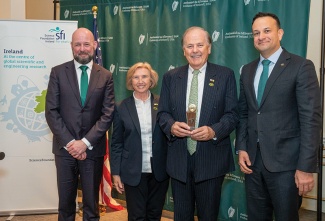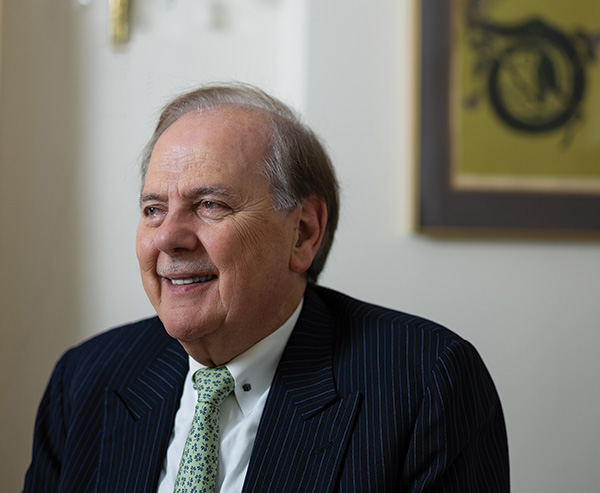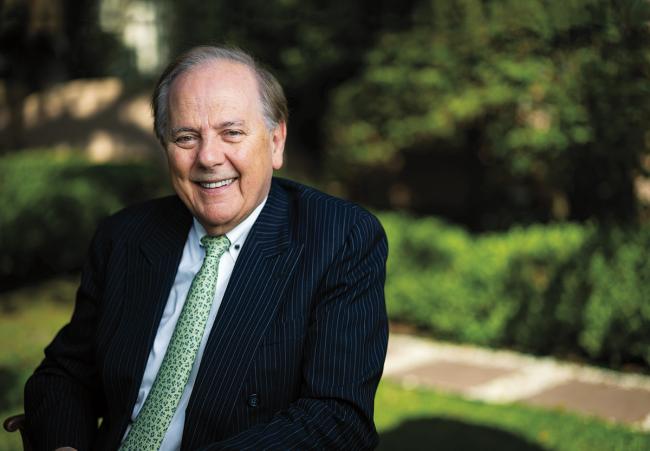Photos of Dr. Whelton by Rusty Costanza
Compassionate Doctor, Tireless Researcher
Dr. Paul Kieran Whelton leads the way in the prevention and treatment of high blood pressure, a global killer.
Dr. Paul Kieran Whelton leads the way in the prevention and treatment of high blood pressure, a global killer.
The significance of high blood pressure as a health risk is beyond question. Why we know this scientific fact and its implications for the treatment and prevention of a highly preventable condition is largely because of the work of Dr. Paul Kieran Whelton.
Whelton is the Show Chwan Health System Endowed Chair in Global Public Health at Tulane’s School of Public Health and Tropical Medicine. He is also a legend in his field.
High blood pressure has been the focus of Whelton’s work throughout his career, which began at medical school in Cork, Ireland.
Whelton has published more than 560 peer-reviewed manuscripts, which have been cited by others more than 120,000 times. He is ranked as one of the top 500 U.S. investigators in the field of medicine by Research.com.
And he’s not stopping.
Prevention Is Always Better
When Whelton began his medical career as a nephrologist, a kidney doctor, it was the early stages of dialysis, and transplants were very new.
“We were doing a lot of nutritional therapy to try to slow or prevent the progression of kidney disease,” he said.
He moved to the United States for his internal medicine and nephrology training at Johns Hopkins. After more than a decade on the faculty at Johns Hopkins as an academic nephrologist, he became increasingly interested in population studies. He realized that clinical epidemiology could enhance the opportunities to prevent and control disease “because epidemiology focuses on tackling disease risk factors and aims at prevention and treatment upstream.”
He saw limitations as a clinician treating only individual patients “because you are, for the most part, taking care of people with established disease. ... And, for the most part, it’s very hard to reverse that process in patients with chronic diseases such as cardiovascular and kidney disease.
“Prevention is always better than treatment. For example, if you treat somebody’s blood pressure down to a given level, it will reduce risk — and do it very well.... But the risk will never be the same as that in somebody who has the same level of blood pressure naturally. That got me interested in prevention, not only prevention of cardiovascular disease, but for me, as a nephrologist, prevention of kidney disease.”
Whelton subsequently earned a master’s degree in clinical epidemiology from the London School of Hygiene and Tropical Medicine and a doctoral degree in prevention from the National University of Ireland.
He then returned to Johns Hopkins, where he was professor of epidemiology in the School of Hygiene and Public Health and professor of medicine in the School of Medicine. Among many leadership roles at Hopkins, he was the founding director of the Welch Center for Prevention, Epidemiology, and Clinical Research.
In 1997, Whelton began his 25-year relationship with Tulane. He is a former dean of the medical and public health schools, and he has served as senior vice president for the health sciences.

Accolades
In recognition of Whelton’s lifetime of work, Irish Taoiseach (Prime Minister) Leo Varadkar presented him with the Science Foundation Ireland St. Patrick’s Day Science Medal for Academia at a ceremony at the Irish Embassy in Washington, D.C., on March 16, 2023.
Remarking on the honor, Tulane President Michael A. Fitts said, “As one of the world’s leading authorities on hypertension, Dr. Whelton has had a profound impact both at our university and globally. We are grateful for the insight his work has provided on this vital health condition and are proud of this tremendous honor bestowed on him by his native country.”
In a letter nominating Whelton for the St. Patrick’s Day award, Dr. Michael J. Klag, Second Century Distinguished Professor and Dean Emeritus of the Johns Hopkins School of Public Health, wrote, “With respect to research, it is impossible to overstate Paul’s enormous impact on the practice of medicine, especially as it relates to the prevention and management of high blood pressure (BP).
“As a nephrologist, Paul had a special interest in the application of epidemiological methods to the study of kidney disease, and was one of the first, if not the first, to do so.”
Among other awards that Whelton has received is the Tulane Hall of Fame Research, Scholarship and Artistic Achievement Award, presented in November 2022. A scientific symposium on the topics of hypertension, cardiovascular and chronic kidney disease was also presented by the Tulane School of Public Health and Tropical Medicine in November in honor of Whelton’s 75th birthday.

Big Questions
Among the big questions that Whelton has addressed through many National Institutes of Health–funded clinical trials is, “if you treat high blood pressure, can you reduce the risk of complications?” The answer is yes.
“We got that answer pretty early on,” said Whelton.
A second question was, “can you identify the exposures that cause high blood pressure, and if you intervene on some of these, can you prevent the occurrence of high blood pressure?”
Whelton said, “We identified the major risk factors for high blood pressure. … They’re all the ones you know — overweight and obesity, certainly an important one; excessive sodium intake; insufficient potassium intake; unhealthy diets; lack of physical activity, all types; and alcohol consumption. Those are the six big risk factors that are responsible for most high blood pressure.”
For most people with high blood pressure, “it’s usually a lifestyle issue,” said Whelton.
Changing lifestyles is difficult. But it can be done. “We learned how to do it, and we learned how to do it effectively. ... We know what to do.”
Through other clinical studies, Whelton has investigated the relative efficacy of different drugs that lower blood pressure. Many drugs work, he said, and using a combination of drugs at low doses is generally effective. For most people, control of high blood pressure is more important than the specific agents that are used to treat the high blood pressure.
New High Blood Pressure Definition
Whelton chaired the 2017 American College of Cardiology/American Heart Association Blood Pressure Guideline Writing Committee that redefined the diagnosis of hypertension and recommended a lower systolic/diastolic treatment target of less than 130/80 mm Hg.
The recommendation was based on the Whelton-led Systolic Blood Pressure Intervention Trial or SPRINT, which proved that more intensive treatment to attain a lower systolic/diastolic blood pressure target of less than 120/80 mm Hg was far more beneficial than the 140/90 mm Hg target that was being recommended prior to the trial.

Dr. Paul Whelton at home in New Orleans
The Groundwork Is Laid
Although the SPRINT findings demonstrated that more intensive treatment provides impressive health benefits and the guidelines recommend lower blood pressure treatment targets than previously advised, clinicians in the United States have been slow to implement the new guideline recommendations.
“Logic tells you,” Whelton said, “compelling clinical trial findings and guideline recommendations will be applied in clinical practice, but that’s not the case.”
Whelton said increasing attention is being paid to implementation trials.
“Now the big push is for implementation of best practices,” he said. “That’s what the NIH is funding to a large extent, for all the right reasons. Colleagues at Tulane are leading several important implementation trials, including the application of more intensive blood pressure treatment goals in federally qualified health clinics in Louisiana and Mississippi.”
Whelton is currently serving a three-year term as president of the World Hypertension League (WHL), which is a nongovernmental, not-for-profit organization with close ties to the World Health Organization. The WHL plays a major role in supporting practice, education and research related to the prevention and management of high blood pressure in middle- and low-income countries such as China, India and the Philippines as well as sub-Saharan Africa. Whelton is also working with colleagues in Brazil who are conducting two large SPRINT-like trials that are investigating the effect of intensive blood pressure reduction on cardiovascular disease, cognitive function and dementia.
“Can we do better? Of course, we can do better. Should we be doing better? It’s criminal that we’re not doing better.”
Dr. Paul Whelton
At this stage of his career, Whelton said it’s still exciting and interesting to be doing “upstream” work, saving lives and improving health on a large population scale, on the ground, in communities and in collaboration with partners. He is also excited to be based at Tulane, where he is surrounded by many outstanding colleagues in the Department of Epidemiology and elsewhere in the university, which continues to be an excellent place to continue to try to solve these global health problems.
“Can we do better? Of course, we can do better,” said Whelton. “Should we be doing better? It’s criminal that we’re not doing better.”































































